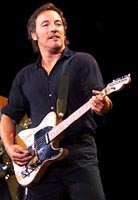
MUGGER
http://www.jewishworldreview.com -- LAST WEEK'Spolitical news was fairly run-of-the-mill. Another makeover for Al Gore; George W. Bush polling extremely well on his Social Security reform plan (59 percent favor it, according to USA Today); Jon Corzine's $35 million primary win in New Jersey (which will backfire in November, mark my words: his opponent, Bob Franks, might be a bland and moderate Republican, but voters are going to be sick and tired of Corzine's mug); Rick Lazio gaining even more traction against Hillary Clinton in New York, despite his horrible taste in music; and the usual babble of talk-show pundits claiming that U.S. citizens aren't currently paying attention to the presidential race, as if they will come November.
In addition, Wall Street Journal editor Robert Bartley, in his June 12 column, essentially told the GOP's right wing to get over their hesitation about Bush's preference for Pennsylvania Gov. Tom Ridge as his runningmate. Making clear that Ridge, although nominally pro-choice, is firmly opposed to partial-birth abortion, Bartley wrote: "In fact, Gov. Ridge lands squarely in the mushy middle of the abortion issue, a position he shares with the majority of Americans, 80% maybe. To be up front about it, that is also where I stand. G-d has never revealed to me when the soul enters the body, and I don't think science has anything useful to say on the subject."
Bartley doesn't endorse Ridge, of course, but read between the lines and he's counseling fellow conservatives to look at the big picture-like defeating Gore and preventing Dick Gephardt and David Bonior from running the country.
One issue stood out in my mind, however, and I thought it was a disastrous Bush campaign mistake: Why the heck didn't the Governor lacerate the lawyer-beholden Clinton administration, the Justice Dept.'s vindictive Joel Klein and Judge Thomas Penfield Jackson's ruling that Microsoft be broken up? Bush has privately said he wouldn't pursue this kind of flat-earth litigation in his administration. Now, after he's successfully traversed the Social Security waters, which were once assumed to be treacherous, and as he's gaining more confidence on the stump with a sound and far-reaching defense plan, why doesn't he stand up for entrepreneurship and expose this scandalous ruling for the farce it that is?
It's not as if he'd lose points politically. Anyone who agrees with the harsh judgment is squarely in Gore's or the blessed Ralph Nader's camp anyway. An angry speech detailing exactly why and how Bill Gates, and by extension any person who has the guts to pursue the American Dream, got screwed last week would represent extraordinary leadership, certainly the kind we haven't seen at a national level since Bush's father marshaled world allies to fight against Saddam Hussein.
 |
| Carlson |
This example of Bush's cowardice is disheartening. After all, when Time's Margaret Carlson, a squishy Hillary Clinton-liberal of the most pernicious kind, praises the Republican candidate for his silence, surely that's a wake-up call to Bush's Austin hq. Carlson, on last Saturday's Capital Gang, said: "George Bush is wise not to comment, because he wants to follow the law, and actually the country is fortunate that there are people like Joel Klein and Judge Thomas Penfield Jackson willing to take on this icon of the dot.com IPO world, these, you know, rich guys who don't think there's any place in America for regulation, and they should just be able to take away your privacy, decide what you're going to have."
What a chilling nod to class warfare and ignorance. While Carlson and her Democratic friends were taking the safe route to their own cushy careers, innovators like Gates took chances with their own lives, daring to be great instead of settling for being upper-middle-class know-nothings. Gates is just one representative of the group of entrepreneurs who've fueled the economic boom that Bill Clinton takes credit for. And while nitwits like New York Times editorialists pontificate about the just reward for Gates' hubris, just think of all the men and women who've also tried to rise above mediocrity, who worked day and night, but failed. That Gates is the scapegoat for the entrepreneurial class of the 90s-like Michael Milken was in the 80s-is a crime in and of itself. Joel Klein ought to be disbarred, along with Clinton. Then they could both find jobs with Talk/Miramax.
There's value in the guts and vision of these Americans, and just because Gates is now fabulously wealthy is no reason to punish him. Sure, Microsoft sometimes operated on the border of existing antitrust laws; that's what happens when speed-of-light technology is beyond the comprehension of a legal system that adheres to laws passed more than 100 years ago. Judge Jackson, who's barely computer literate, was pissed off at Gates' attitude-as if his obnoxious testimony should have anything to do with the future of Microsoft-and Joel Klein's just a Clinton stooge who was gunning for a personal victory.
Bush should speak out now for all Americans who, in the immortal words of Bill Clinton, "play by the rules." The real rules, those intended by the Founding Fathers, not those subverted by current politics.
Despite the temporary success of Bush's effort, he remains too timid. His silence on an enormously important issue like the discriminatory action against Gates is reflective of his strategy: campaign as if you're the incumbent, even when you're the challenger, and, in light of the strong economy, draw sharp distinctions between yourself and Gore.
The New York Times, not surprisingly, recommends that Microsoft's appeal go straight to the Supreme Court. Even Howell Raines and his two-fingered typists can see that if the case drags out through the election, and Bush wins, a new Justice Dept. will probably drop the entire proceedings. As that's the most probable outcome, why doesn't Bush just say so now? It's not as if he won't be cheered by Americans who've profited by the techno revolution, both monetarily and in the quality of their lives.
In its June 8 editorial the Times piously wrote: "Though the content of Judge Jackson's ruling was unsurprising, the tone was startlingly stern. Microsoft, he says, has been 'not credible,' 'untrustworthy,' 'disingenuous.' And he added, 'There is credible evidence in the record to suggest that Microsoft, convinced of its innocence, continues to do business as it has in the past and may yet do to other markets what it has already done.' Judge Jackson sided completely with the government in part because he mistrusts the company. Yesterday Microsoft reaped the well-deserved consequences."
The following day, The Wall Street Journal was far more realistic in its own editorial: "To state it simply: Either the New Economy's corporate roster opens up new opportunities for the kind of fun and games that subsidize the Beltway establishment-or it shuts them down."
FORTY-ONE SHOTS OF ATTENTION
Why is aging rock star Bruce Springsteen sticking his nose into the
business of New York City? As widely reported in the press,
Springsteen's written a new protest song, "American Skin," about the
tragic death of Amadou Diallo. The song indicts not only Rudy Giuliani
and the city's entire police corps, but also the four acquitted officers
who mistakenly shot the innocent immigrant.
Part of the lyrics run: "Lena gets her son ready for school/She says now on these streets Charles/You got to understand the rules/Promise me if an officer stops you'll always be polite/Never ever run away and promise mama you'll keep your hands in sight/Cause is it a gun?/Is it a knife?/Is it a wallet?/This is your life/It ain't no secret/It ain't no secret/The secret my friend/You can get killed just for living in your American skin."
 |
| Springsteen at the Garden |
Springsteen begins and ends the song, which hasn't been recorded yet and was just debuted last week in Atlanta, with the repetitive shout "41 shots!" The affluent pop star began a two-week stand at Madison Square Garden on June 12, the profits of which, I'm sure, will be handed over to the Diallo family, with a cut to Al Sharpton. Giuliani, upon hearing about the song, said, "Unfortunately, a lot of people have exploited this case. I don't know that that's the situation here."
Springsteen's turned a little bit creepy. If the Diallo killing affected him so greatly, why didn't he write the song shortly after the incident happened? That's what Neil Young-along with Crosby, Stills & Nash-did just days after the Kent State University student killings in 1970, recording and releasing the battle hymn "Ohio" almost instantaneously. (Ironically, the lyric, "Tin soldiers and Nixon's coming/We're finally on our own/This summer I hear the drumming/Four dead in Ohio," proved to be illusory. After the horrible events of May 4, college students found out that demonstrations weren't just keggers with a bit of drama thrown in; the student antiwar movement wound down soon after.)
I have nothing against protest songs. Bob Dylan was a master of the art in the early 60s when he was a very young man and there was a lot more social unrest in the country. He also, at that point, wasn't living in a Hollywood mansion, but rather in a cheap apartment in the Village, still mooching money and drinks from people. Springsteen's now 50, and this latest song does seem to represent a selfish quest on his part for a personal Fountain of Youth. In 1987, he wrote the following in the stunning "Brilliant Disguise": "I'm just a lonely pilgrim/I walk this world in wealth/I want to know if it's you I don't trust/'cause I damn sure don't trust myself."
The man has a point: I don't trust Springsteen,
JWR contributor "Mugger" -- aka Russ Smith -- is the editor-in-chief and CEO of New York Press (www.nypress.com). Send your comments to him by clicking here.

